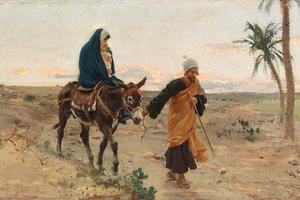All Saints Day: You Were Created to Become a Saint
“All the faithful of Christ, of whatever rank or status, are called to the fullness of the Christian life and to the perfection of charity.” (Lumen Gentium 40)

Blame Diocletian. Or thank him, depending on how you look at it.
It had been the Early Church’s custom to solemnly honor each martyr on the anniversary and at the place of death. Diocletian’s Great Persecution (303-311), during which he ordered the murder of more than 20,000 Christians, left far too many martyrs to honor separately.
Still, the Church felt every martyr deserved veneration, and so she appointed a common day for all. Common days were observed as far back as the early 300s AD, but it wasn’t until the 700s that Pope Gregory III established the common day — Nov. 1 — and consecrated a chapel in St. Peter’s Basilica to all saints.
Since then, Nov. 1 has been known as All Saints Day.
I absolutely love this feast day. For me, it’s such a hope-filled one because it’s a reminder that there are oodles upon oodles of saints in heaven upon which we can call for intercession. So, many, in fact, that we don’t (perhaps can’t) know all their names.
How’s that for a morale booster?
It gives me hope in another way as well. There are so many saints in heaven that we don’t, or perhaps can’t, know all their names.
Who are all those saints?
They once were people like you and me. They were regular people who lived on this earth and did their best to love God and accept his love in return. They are folks who lived ordinary lives with extraordinary love for God.
Read what St. Francis de Sales wrote about the saints:
To every man, however holy he may be, there always remains some imperfection, because he has been drawn from nothingness: so that we do no injury to the saints when, in recounting their virtues, we relate their sins and defects; but, on the contrary, those who write their lives seem, for this reason, to do a great injury to making by concealing the sins and imperfections of the saints, under pretense of honoring them, not referring to the commencement of their lives, for fear of diminishing the esteem of their sanctity. Oh, no, indeed, this is not to act properly; but it is to wrong the saints and all posterity.
The saints didn’t know they would be saints until after they died. During their lifetimes, they lived as holy a life as they could. For that, we can and should love them for their faults as well as for their sanctity.
We should do the same for ourselves. In other words, regardless of our state of life, we need to live as holy a life as we can and take our faults in stride. Not to ignore them, of course, but not to be put off by them either.
Our goal is to work as hard as we can to become canonizable saints.
Really, that’s the universal call to holiness issued in the Vatican II document, Lumen Gentium.
Referring to the various means by which we can obtain God’s grace, it states:
Fortified by so many and such powerful means of salvation, all the faithful, whatever their condition or state, are called by the Lord, each in his own way, to that perfect holiness whereby the Father Himself is perfect. (LG, 11)
You see, that’s the thing. To put it very simply, canonized saints are the ones whose lives were recognizably virtuous in a way that could be documented and proven. But, everyone who is in heaven is a saint.
So, why strive to be a canonizable saint?
No matter what, we’re called to holiness to the degree that we’ll be welcomed into Eternity. To be canonizable means to go a step further. It means to live our lives, profess our faith, worship our Lord, and treat others in such a way that we leave a trail of holiness, so to speak, as a witness of our love for God. Our witness, then, becomes hope and encouragement for others to strive for canonizable sanctity as well.
In a way, whether we become canonized is immaterial. What’s important is living in great love for God and in accordance with his laws. Then we’ll make it to heaven, and All Saints Days gives us hope that will happen.
This article originally appeared at the Register Nov. 1, 2016.
- Keywords:
- all saints day
- saints
- communion of saints

















